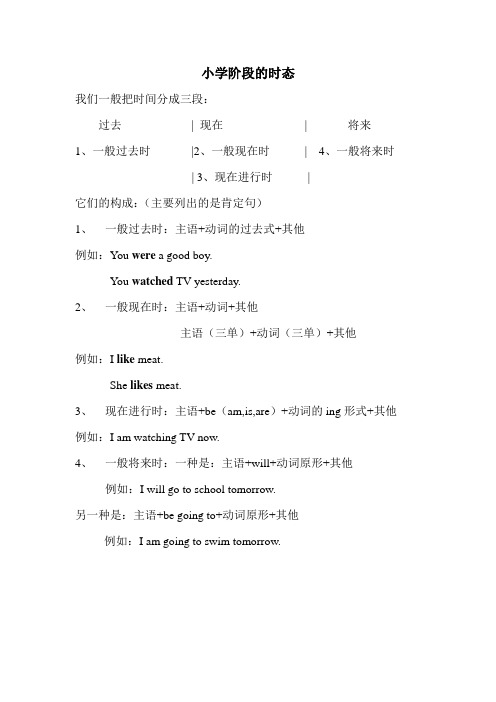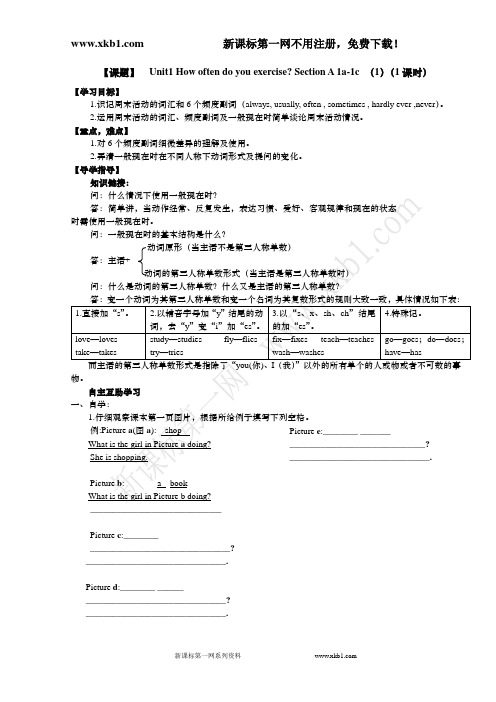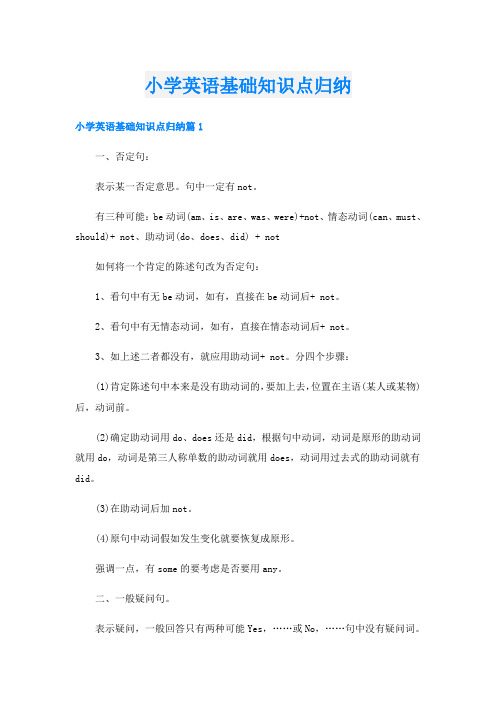特殊疑问句的变法(即对划线部分提问)
- 格式:docx
- 大小:17.68 KB
- 文档页数:5

小学阶段的时态我们一般把时间分成三段:过去| 现在| 将来1、一般过去时|2、一般现在时| 4、一般将来时| 3、现在进行时|它们的构成:(主要列出的是肯定句)1、一般过去时:主语+动词的过去式+其他例如:You were a good boy.You watched TV yesterday.2、一般现在时:主语+动词+其他主语(三单)+动词(三单)+其他例如:I like meat.She likes meat.3、现在进行时:主语+be(am,is,are)+动词的ing形式+其他例如:I am watching TV now.4、一般将来时:一种是:主语+will+动词原形+其他例如:I will go to school tomorrow.另一种是:主语+be going to+动词原形+其他例如:I am going to swim tomorrow.句型句型有以下几种:1、肯定句。
例如:I am a pupil.You are a girl. I watched TV yesterday.2、否定句。
凡是句子中含有not的就是否定句。
例如:I am not a pupil. You aren’t a girl.I didn’t watch TV yesterday. 3、疑问句。
带有问号的句子就是疑问句。
疑问句又分为一般疑问句和特殊疑问句。
凡是能用yes和no来回答的句子就是一般疑问句。
例如:Are you a boy?Did you watch TV yesterday?含有what,where,who,when等的句子为特殊疑问句。
例如:What are you going to do?When did you go to school?4、祈使句。
没有主语的句子就是祈使句。
例如:Be quiet,please.请安静。
Don’t worry.不用担心。
句型转换句型转换一般就是在前三种句子之间转换。

【课题】Unit1 How often do you exercise? Section A 1a-1c (1)(1课时)【学习目标】1.识记周末活动的词汇和6个频度副词(always, usually, often , sometimes , hardly ever ,never)。
2.运用周末活动的词汇、频度副词及一般现在时简单谈论周末活动情况。
【重点,难点】1.对6个频度副词细微差异的理解及使用。
2.弄清一般现在时在不同人称下动词形式及提问的变化。
【导学指导】知识链接:问:什么情况下使用一般现在时?答:简单讲,当动作经常、反复发生,表达习惯、爱好、客观规律和现在的状态时需使用一般现在时。
问:一般现在时的基本结构是什么?动词原形(当主语不是第三人称单数)答:主语+动词的第三人称单数形式(当主语是第三人称单数时)问:什么是动词的第三人称单数?什么又是主语的第三人称单数?答:变一个动词为其第三人称单数和变一个名词为其复数形式的规则大致一致,具体情况如下表:1.直接加“s”。
2.以辅音字母加“y”结尾的动词,去“y”变“i”加“es”。
3.以“s、x、sh、ch”结尾的加“es”。
4.特殊记。
love—loves take—takes study—studies fly—fliestry—triesfix—fixes teach—teacheswash—washesgo—goes;do—does;have—has而主语的第三人称单数形式是指除了“you(你)、I(我)”以外的所有单个的人或物或者不可数的事物。
自主互助学习一、自学:1.仔细观察课本第一页图片,根据所给例子填写下列空格。
例:Picture a(图a): shopWhat is the girl in Picture a doing?She is shopping.Picture b:_______ a bookWhat is the girl in Picture b doing?______________________________Picture c:________________________________________? ________________________________.Picture d:________ ______________________________________? ________________________________. Picture e:________ ______________________________________? ________________________________.2.根据汉语提示,完成下列其他weekend activity (周末活动)短语。

初中英语初⼀特殊疑问句第⼋讲特殊疑问句【学习⽬标】:掌握肯定句转化为⼀般疑问句,否定句,特殊疑问句的⽅法【知识要点】:特殊疑问句⼀知识回顾:(1)肯定句改否定句的⽅法——⼀步法1、在be动词后加not。
如:is not,are not,am not,was not,were not;2、在can,should,will等后加not。
如:cannot,should not,will not;3、上述都没有的,在动词前加助动词否定形式don’t/doesn’t/didn’t。
4、some改成any。
(2)肯定句改⼀般疑问句的⽅法——⼀步法1、把be动词放在句⾸,剩下的照抄,(some改成any,my改成your等)句点改成问号。
2、把can,shall,will等放到句⾸,剩下的照抄,(some改成any,my改成your等)句点改成问号。
3、上述都没有的,在句⾸请助动词Do/Does/Did帮忙,剩下的照抄,(some改成any,my改成your等)句点改成问号。
⼆、特殊疑问句肯定句改特殊疑问句的⽅法——四步法1、在⼀般疑问句的基础上,句⾸添加⼀个疑问词即可,可根据划线部分确定是什么疑问词。
2、接着找be动词或can,shall,will等放在疑问词后⾯,若没有则请助动词do/does/did 帮忙,写在疑问词后⾯,how many除外,必须先写物品,再写be动词等。
3、划线部分去掉后剩下的内容照抄,(some改成any,my改成your等)4、句点改成问号。
特别注意:特殊疑问词有W---what, who, which, whose, when, whereH---how, how old, how many, how much, how often, how long, how soon, how far【经典练习】⼀就划线部分提问A.1. He is from China. ________________________(变为特殊疑问句)2. I can speak English well. _______________________(变为特殊疑问句)3.They will visit the zoo tomorrow. __________________________(变特殊疑问句)4. Lucy was born in China._____________________(变特殊疑问句)5. You should learn English well. _______________________(变特殊疑问句)6. There are 50 students in the classroom. _________________________(变特殊疑问句)B .1. I wash my clothes every day.__________________________(变特殊疑问句)2. He likes playing basketball very much.___________________________(变特殊疑句)3. They do their homework every day.____________________________(变特殊疑问句)⼆.按要求改写句⼦1.That's his pencil case. (改为⼀般疑问句)____________________________2. This is a pencil. (提问)______________________________________3. This is my book.(改为否定句)_________________________________4.The baseballs are on the sofa.(改为⼀般疑问句)____________________________________5. Is it in the backpack?(否定回答)______________________________6. I can see some books on the table.(提问)_____ can you ______ on the table?7. Tommy's math book is on the floor.(对划线提问)_______ _________ Tommy's math book?8. That is my good friend .(否定句)_______ _______ _______good friend.9. These are her sisters.(⼀般疑问句)_______ _____ her sisters?10. Thanks very much.(同义句)_____ ____ very much.11.My parents like salad.(否定句)My parents _____ _____ salad.12.Kate likes French fries.(变为⼀般疑问句并作肯定回答)_____ Kate _____ French fries? Yes, _____ ______. .13.Francisco likes apples. (就划线部分提问)__________ _______ Francisco __________ ?14.my mother goes shopping three times a week. (就划线部分提问)__________ _______ does your mother go shopping?15.Francisco likes apples. (就划线部分提问)__________ _______ Francisco __________ ?16.My home is 3000 meters away from the nearest bookshop.(就划线部分提问)is it from home to the nearest bookshop?17,My father bought me a lovely cat last year. (就划线部分提问)bought a lovely cat last year?18.My father bought me a lovely cat last year. (就划线部分提问)your father you a lovely cat?19.My father bought me a lovely cat last year. (就划线部分提问)did your father buy for you last year?选择题1.Excuse me ,can you tell me __ is the way to the shopping hall ?A.whereB.whichC.whyD.who2.____ got the 100th gold metal in the Olympics for China ?- Zhang Yining .A. WhoB.WhatC. WhenD. Where3____ are you talking about ?-W e are talking about the Asia Games in Guangzhou .A.WhatB. WhereC.WhyD.How4.___ do you visit your uncle ?- once a week.A.How longB.How manyC.How oftenD.How soon5.___ milk do you need ?- Three cups .A. How manyB.How muchC.How farD. How long6. —How often do you play a ball game at school?—________A. All dayB.One hourC. Once a dayD. Half an hour7. —I'm not sure ________Mr Wang goes to see his parents.—Twice a week.A. how longB. how oftenC. how soonD. how many8. —________have you been in China?—Since last Wednesday.A. How soonB.How oftenC. How longD. How much【课后作业】1 This soccer ball is white. (就划线部分提问)this soccer ball?2 That shirt is ¥35. (就划线部分提问)Is that shirt?3 Ann does her homework today.(否定句)Ann her homework today.4 I like sports.(改为⼀般疑问句)you sports?5 These are my shoes.(⼀般疑问句)these shoes?6 The pencil case is green. (提问)Is thepencil case?7 I like volleyball.(⼀般疑问句)you vollerball?8 The socks are twelve dollars. (就划线部分提问)are these socks?9 My brother can play the violin.(就划线部分提问)Can brother do?10 Tom can sing in English .(变⼀般疑问句并作回答)Tom sing in English ? Yes, . No, .11 Her daughter can dance.(否定句)Her daugher dance.。

小升初毕业班精选对划线部分提问专项练习1.(对划线部分提问)______ his father’s______ ?2.My first name is Tom.(改为同义句)My ___________ ________ is Toms.3.Mr King is from America.(对划线部分提问)__________ is Mr King__________?4.Jenny is English.(对划线部分提问)What’s ______________________________?5.He’s an actor.(变为复数)__________ are ____________________6.Jack has a basketball.(改为否定句)________________________________________.7.I have three cousins.(对划线部分提问)________________________________________?8.These are Jenny’s CDs.(对划线部分提问)_____________________________?9.Does your uncle have any children?(作肯定回答)_________ ________ ______.10.T hat is a video game.(变为复数)___________________________________________.11.T om likes action movies.(改为一般疑问句)_____________________________________________? 12.I like fishing. I like painting.(合并成一个句子)_________________________________________________.13.T hey don’t like action movies. They don’t like documentaries.(合并成一个句子)_______________________________________.14.A my’s mother likes romantic movies.(对划线部分提问)______________________________?15.L inda likes sports programs.(改为否定句)______________________________.16.D oes your mother like action movies?(作肯定回答)____________________________________________ .17.H is favorite football player is Beckham.(对划线部分提问)___________________________________________________________? 18.H e likes action movies, but he prefers horror movies.(变为同义句)He _____ horror movies ____ action movies.19.T he walkman is Dave’s.(对划线部分提问)__________________________________________________?20.I have three cousins. (对划线部分提问)___________________________________________________?21.H er backpack is on the sofa.(对划线部分提问)_______________________________________________?22.T here are two bathrooms in my house.(对划线部分提问)_____________________________________________________?23.I s there a TV in your bedroom?(作肯定回答)_____________________________________________.24.T here is a dining room in my house. There are three bedrooms in my house.(合成一个句子)(1)__________________________________________________________.(2)__________________________________________________________.25.T here are some books in the bookcase.(变为一般疑问句)______________________________________?26.T here’s a supermarket opposite the post office.(划线提问)27.T he shoe store is on Adams Street, across from the museum.(划线提问)28.A re there any parks here?(作否定回答)29.T here’s a railway station over there.(改为一般疑问句)30.T he video store is opposite the gym.(变为同义句)31.T here are four hotels on the street. (划线提问)32.T he library is on Mill Street, next to the hospital.(划线提问)33.T he museum is across from the school.(改为一般疑问句)34.T he park is on Main Street.(划线提问)35.T here is a desk and chair in the room.(改为否定句)36.S he teaches English in our school.(改为同义句)She ______________English______ in our school.37.I have a son and a daughter.(划线提问)______________________children _______you _____?38.S he doesn’t like swimming. She doesn’t like fishing.(合并成一个句子)She ________________swimming ________________fishing.39.T here are three bedrooms in the house.(用have 改写为同义句)The house ________________three bedrooms.40.H is house is next to our school.(变为一般疑问句)________________________________________________?41.S he has a computer.(变为一般疑问句)________________________________________________?42.T he shoe store is next to the drug store. It’s also next to the post office.(合并成一个句子)The shoe store is ________ the drug store ______ _ the post office.43.L iz is a teacher.(划线提问)________________ is a teacher?44.T om likes doing his homework after school.(改为否定句)45.T hey are women teachers.(改为单数句子)46.T here is a big building near my home. There is a supermarket near my home.(合并成一句)47.M y school is between a park and a bank.(划线提问)48.a nd, she, likes, reading books, watching movies, also, likes, she(连词成句)49.K ate has two uncles and an aunt.(改为否定句)50.T he books are Steven’s.(改为一般疑问句)51.T here is some soda in the bottle.(变为一般疑问句)52.T here are nine apples on the desk.(划线提问)53.W e need to buy some chocolates.(改为否定句)54.T here is a little ketchup in the bottle.(划线提问)55.H ow much meat is there in the shop?(用a lot of回答)56.T hey’d like some juice and hamburgers.(划线提问)57.W ould you like a large pizza?(用small 改为选择疑问句)58.T he potatoes are one dollar a kilo.(划线提问)59.T he bread is three dollars and fifty cents a loaf.(划线提问)60.I’ll have a glass of juice, please.(划线提问)61.W e’d like two cups of tea.(划线提问)62.T he soap is only one dollar a bar.(划线提问)63.W e have porridge, bread and eggs for breakfast.(划线提问)64.I’d like onions on it.(划线提问)65.J ack wants a dozen eggs.(同一句转换)66.R obbie does the high jump very well.(用can 改写)67.G ary can run the 100-meter hurdles.(划线提问)68.T racy can do pushups.(改为否定句)69.P enny can throw the shot put.(改为一般疑问句)70.C an Joe play table tennis?(作肯定回答)71.I need a baseball bat to play baseball.(对划线部分提问)72.Y ou can play football on the football field.(对划线部分提问)73.J enny’s favorite sport is playing volleyball.(对划线部分提问)74.I s diving your favorite sport?(作否定回答)75.T ony is good at running.(变为否定句)76.R obbie can do a somersault.(变为一般疑问句)77.H e can run the 100-meter race.(对划线部分提问)78.W e can run the 400-meter race on the running track.(对划线部分提问)79.T here are two pools in the sports center.(对划线部分提问)80.S andy’s favorite sport is roller-skating.(对划线部分提问)81.J enny is good at swimming.(变为否定句)82.I can also play table tennis and play volleyball.(对划线部分提问)83.C an you do a handstand?(作肯定回答)84.L iu Xiang is my favorite sports star.(对划线部分提问)85.H e’s learning diving now.(对划线部分提问)86.T here is a dresser in this room.(改写为复数形式)87.T he refrigerator is in the kitchen.(对划线部分提问)88.A re there any hotels near here?(肯定回答)89.T here are some lions in the zoo.(改为否定句)90.H er mother is a policewoman.(对划线部分提问)91.T here are three apples on the plate.(改为否定句)92.K ate likes making kites.(改为一般疑问句)93.T here are six people in my family.(对划线部分提问)94.T hese video games are Bob’s.(对划线部分提问)95.I t’s fine.(对划线部分提问)96.I often go to school on foot.(对划线部分提问)97.T he meat is ten yuan.(对划线部分提问)98.T he factory is two kilometers from here.(对划线部分提问)99.The river is five metres wide.(对划线部分提问)100.He didn’t come to school because he was ill in bed.(对划线部分提问)参考答案:96.How do you often go to school?97.How much is the meat?98.How far is the factory from here?99.How wide is the river?100.Why didn’t he come to school ?。

we尔引导的特殊疑问句we尔引导的特殊疑问句需要变成you。
陈述句中的we,需要变成you.例如:we need some books.变成:what do you need?或者一般疑问句:do you need any books?其他人称基本不变。
这样变化方便说的时候好理解。
这样的变法还有I也要变成you。
除此之外,英语中some 和any也要变,陈述句用some,疑问句用any。
当主语是we的时候,如果对主语提问,那么用特殊疑问词who.例如,we are in Class One, Grade Two.我们在二年级一班。
提问就应该是who are in Class One, Grade Two?谁在二年级一班?如果对地方提问,那么应该用where.这句话提问就是where are you?你们在哪?we的名词性物主代词是ours。
1、we是复数第一人称代词的主格形式,其宾格形式是us。
在句中用作主语时须用主格形式,用作宾语时用宾格形式,用在动词be 后作表语时有时可用主格形式,有时可用宾格形式,如we作为后面句子的真正主语而被强调,则须用主格形式。
2、英语中的物主代词可分为形容词性物主代词和名词性物主代词。
名词性物主代词是在物体已经指出的情况下用来代替已知物体的物主代词,后面不需要加上已知名词。
物主代词有形容词性(my,your等)和名词性(mine, yours等)两种,形容词性的物主代词属于限定词。
3、在英语中,名词的格有3种:主格、宾格、所有格。
其中个体名词表示某类人或东西中的个体,如girl(女孩)等;集体名词表示若干个个体组成的集合体,如audience(观众,听众)。

小学英语基础知识点归纳小学英语基础知识点归纳篇1一、否定句:表示某一否定意思。
句中一定有not。
有三种可能:be动词(am、is、are、was、were)+not、情态动词(can、must、should)+ not、助动词(do、does、did) + not如何将一个肯定的陈述句改为否定句:1、看句中有无be动词,如有,直接在be动词后+ not。
2、看句中有无情态动词,如有,直接在情态动词后+ not。
3、如上述二者都没有,就应用助动词+ not。
分四个步骤:(1)肯定陈述句中本来是没有助动词的,要加上去,位置在主语(某人或某物)后,动词前。
(2)确定助动词用do、does还是did,根据句中动词,动词是原形的助动词就用do,动词是第三人称单数的助动词就用does,动词用过去式的助动词就有did。
(3)在助动词后加not。
(4)原句中动词假如发生变化就要恢复成原形。
强调一点,有some的要考虑是否要用any。
二、一般疑问句。
表示疑问,一般回答只有两种可能Yes,……或No,……句中没有疑问词。
如何将一个肯定的陈述句改为否定句:1、看句中有无be动词,如有,把be动词提到句首即可。
2、看句中有无情态动词,如有,把情态动词提到句首即可。
3、如上述二者都没有,就应把助动提到句首。
分四个步骤:(1)肯定陈述句中本来是没有助动词的,要加上去,位置在主语(某人或某物)后,动词前。
(2)确定助动词用do、does还是did,根据句中动词,动词是原形的助动词就用do,动词是第三人称单数的助动词就用does,动词用过去式的助动词就有did。
(3)把助动词后提到句首。
(4)原句中动词假如发生变化就要恢复成原形。
强调一点,有some的要考虑是否要用any。
三、特殊疑问句。
表示疑问,有疑问词(在开头),回答有很多种可能。
常用疑问词:What、When、Which、Who、Whose、Why、How如何对划线部分提问:1、将原问句翻译为汉语(在读中要将划线部分重读)。
人称代词的各种形式be动词用法be动词的一般现在时有三种形式,即:am,is,are。
1.如果主语是第一人称I(我)时,be动词用am。
如:I am a student.我是一名学生。
I am还可缩写成I'm。
如:I'm David.我是大卫。
2.如果主语是you(你,你们),they(他们,它们,她们)或名词复数(两个以上的人或物)时,be动词必须用are。
如:Are you twelve?你是十二岁吗?Tom and Lily are good friends.汤姆和莉莉是好朋友。
They are at school. 他们在学校。
These are books. 这些是书。
We are students . 我们是学生。
are与主语还可缩写。
如:We are=We're,They are=They're,You are=You're。
而are与not可缩写成aren't。
如:They aren't students.他们不是学生。
但是am与not不能缩写。
3.如果主语是单数名词、不可数名词或单数第三人称代词(he,she,it)时,be动词用is.如:My mother is a teacher.我的妈妈是一名老师。
He is a student.他是一名学生。
She is my friend.她是我的朋友。
It is a dog. 它是一只狗。
is也可与主语缩写,如:He is=He's,My mother is=My mother's等。
但是This is 不可缩写。
而is与not可缩写成isn't。
如:This isn't a book.这不是一本书。
[解题过程]根据以上叙述我们可以把动词的用法以口诀的形式表述出来:我(I)是am,你(you)是are,剩下is留给她(she),他(he),它(it),两个以上都用are。
浅谈小学三四年级be动词语法讲解方法作者:冯佳佳来源:《读写算》2020年第31期摘要三年级开始,英语列为考试科目,学生学习英语不再仅仅以口语为主,语法开始成为学生需要掌握的技能之一。
只有掌握扎实的语法,学生才能在英语学习的道路上走得更稳,走得更远,所以掌握好语法的重要性不容忽视。
关键词小學;三四年级;be动词;语法;讲解;方法中图分类号:G628,H193.5,B014 文献标识码:A 文章编号:1002-7661(2020)31-0203-02英语是一种语言,英语使用者想要准确并流利地传达自己的想法,正确、扎实的语法是基础。
并且语法的运用在小学生考试中体现在方方面面,例如单项选择、改写句子、完形填空等等题型中都涉及到语法的运用,所以掌握好英语语法非常重要。
be动词的语法运用是三四年级学生需要掌握的重点之一,也是难点之一。
一、be动词口诀常见的be动词有三个,分别为am, is, are,一般将其翻译为“是”。
三年级学生最先接触到的be动词语法是根据不同的人称选择不同的be动词,这个语法对于刚上三年级的学生来说是很难掌握的。
但是如果利用下面这个简单的口诀,会非常有效的帮助学生区分不同人称所对应的不同be动词,学生容易掌握且易于学生记忆。
(一)我用am第一人称“我”即英语中的“I”,所对应的be动词是am,例如:I am Yang Ling.翻译为“我是杨玲。
”(二)你用are第二人称“你”即英语中的“you”,所对应的be动词是are,例如:You are Mike.翻译为“你是麦克。
”(三)is连着他、她、它第三人称单数“他、她、它”即英语中的“he, she,it”,所对应的be动词是is,例如:He is Liu Tao.翻译为“他是刘涛。
”She is Helen.翻译为“她是海伦。
”It is a dog.翻译为“它是一只狗。
”(四)考试可能涉及到的题型1.单项选择题例如:()______ is Mike.A. IB. YouC. heD. He此题的答案应该是“D”,首先从句中be动词是“is”,根据口诀“is连着他、她、它”可以判断排除答案“A和B”,“C”错在首字母没有大写。
五年级英语句型转换练习题30题答案解析1.She is a teacher.(变为一般疑问句,并作肯定回答)Is she a teacher?Yes, she is.答案解析:将陈述句变为一般疑问句,需将be 动词提前。
因为原句中有is,所以将is 提到句首。
肯定回答用“Yes, 主语+be 动词”的形式。
2.They are students.(变为一般疑问句,并作否定回答)Are they students?No, they aren't.答案解析:同样将be 动词are 提前变为一般疑问句。
否定回答用“No, 主语+be 动词+not”的形式,aren't 是are not 的缩写。
3.I am happy.(变为一般疑问句,并作肯定回答)Are you happy?Yes, I am.答案解析:当主语是I 时,变为一般疑问句要将I am 变为Are you。
肯定回答用“Yes, I am”。
4.He is a doctor.(变为一般疑问句,并作否定回答)Is he a doctor?No, he isn't.答案解析:把be 动词is 提前变为一般疑问句。
否定回答是“No, he isn't”。
5.We are friends.(变为一般疑问句,并作肯定回答)Are you friends?Yes, we are.答案解析:将be 动词are 提前,变为一般疑问句。
注意这里主语是we,变为疑问句时要变为you,肯定回答是“Yes, we are”。
6.It is a book.(变为一般疑问句,并作肯定回答)Is it a book?Yes, it is.答案解析:将be 动词is 提前变为一般疑问句。
肯定回答用“Yes, it is”。
7.She has a pen.(变为一般疑问句,并作否定回答)Does she have a pen?No, she doesn't.答案解析:当句中有实义动词has 时,变为一般疑问句要借助助动词does,将does 提到句首,has 变为have。
新概念⼀册语法知识⼤全第1单元语法⼀点通(L1-12)Lesson 1 ⼀般疑问句的变法1. Be 动词的⽤法:Be妈妈的三个⼉⼦分别是am, is, are.2. ⽤法⼝诀:我⽤am, 你⽤are, is跟着他她它,复数全部都⽤are.eg: I am a teacher. You are a student. He is a boy.She is a girl. It is a cat. We are students.3. ⼀般疑问句定义:⑴⽤yes或no回答的问句;⑵以系动词(助动词, 情态动词)开头的问句(近期只学Be动词开头).⑶译为“……吗?”的问句。
eg: Are you a student? Is he a boy?4. 由肯定句变⼀般疑问句:⼝诀:找到be动词,直接提句⾸,⼈称做变化,问号别忘了。
(I→you, my →your)eg: ⑴I am a teacher. →Are you a teacher?⑵This is my book. →Is this your book?5. 多学⼀⼿:He is a yes-man. ⼀个唯唯诺诺的⼈。
Lesson 3 否定句的变法1. 1—20的基数词必须会背写。
one two three four five six seven eight nine teneleven twelve thirteen fourteen fifteen sixteen seventeen eighteen nineteen twenty2. 肯定句变否定句:⼝诀:找到be动词,后⾯加not.eg: This is a book. →This is not a book.I am a teacher. →I am not a teacher.缩写:is not=isn’t /'iznt/ are not=aren’t /a:nt/注意:简约回答的肯定式不能⽤缩写,如:Yes, I am / he is / they are 等。
特殊疑问句的变法(即对划线部分提问)特殊疑问句(即对划线部分提问)1.特殊动词到,变化很简要:凡是有问号,动词打颠倒。
(am , is , are ,was ,were, can ,could ,may , might , must ,shall , should , will ,would,另外. have ,has ,had在完成时中作助动词)I am a student . You are sitting here .否定 I am not a student . You are not sitting here .一般疑问 Are you a student ? Are we sitting here?What/ are you ? Where/ are we sitting███?2.包括 do ,does , did ,have ,has ,had 在内的行为动词句型变化口诀分解:A:先将原句谓语(第一动词)寻,依法变为一般疑 ,(一般问句结构:Do,Does ,Did + 主语 +动词原形 +其他成分 + 问号),划线部分用词换,变为相应疑问词;分别提到句首去,原处销掉不留痕。
Her son has six classes at school every day .否定Her son doesn’t have six classes at school every day .一般疑问 Does her son have six classes at school every day?1.(at school) Where do es her son have six classes █████ every day ?2.(every day) When does her son have six classes at school █████ ?3.(six classes) What does her son have ██████at school every day?4.(six) How many classes does her son have██████ at school every day ?5.(have six classes) What does her son do at school every day ?6.(her son) Who has six classes at school every day ?7. (her) Whose son has six classes at school every day ?B: 以上(4)说明定语加名词是整体,一起提到句首去。
如:She has English lessons every evening .What lessons does she have █████████every evening ?C: 以上(5)说明:具体动词笼统化,动词划线问干啥。
如:You do morning exercises at home sometimes.You don’t do morning exercises at home sometimeDo we do morning exercises at home sometime ?What do we do ███████████at home sometime ?D: 以上(6)说明:凡是问主语,语序不变。
(简言之:凡是问开头,后面就照抄,再加问号)如:My father does some housework on Sundays .Who does some housework on Sundays ?Whose father does some housework on Sundays?备注:疑问词相对应的内容what:1、问姓名:What's your name ? →My name is Jim .2、问时间:What's the time? 或What ti me is it? → It's five o'clock.3、问颜色:What color is the hat? → The hat is yellow.4、问数量:What's three and (plus) four? → It's seven.5、问职业:What does your father do?(或What's your father?) →My father is a worker.6、问年龄:What's your age?(或How old are you?) →I'm twelve years old.7、问毛病:What's wrong with your bike? →It's broken.8、问星期几:What day is it tomorrow? → It's Wednesday.9、问东西:What's this / that in English? →It's a black cat.10、问某处有何物:What's in the picture? →There is a bird in it ?11、天气状况:What's the weathe r like today? (How’s the weather today ?)→It's windy.(sunny、rainy、snowy、cloudy)12.对事物提问:13:动词:(动词及对象)用what…do 提问: (时态不变、动词结构不变 )①We usually have an hour for sports after class .(一般现在时)What do you usually do after class ?②He often helps me with my English .(一般现在时)What does he often do ?③She is listening to the radio now .(现在进行时)What is she doing now ?④They are going to watch a football game next Sunday .(一般将来时)What are they going to do next Sunday ?⑤They had an English class yesterday .(一般过去时)What did they do yesterday ?⑥Mother told me not to spend too much time on football .(动词结构不变)What did your mother tell you not to do ?(tell sb not to do sth )如何对表示“时间”的部分提问:1、划线部分表示的是某个具体时间(在几点钟)时, 用what time提问:例:①It's ten o'clock. → What time is it? 或 What 's the time ?②He goes to school at a quarter past seven. →What time does he go to school?2、划线部分表示一日之内的某一时段时用when提问。
例:①They will play football this morning. →When will they play football?②We shall go home at five this afternoon. →When shall we go home?3、划线部分表示的是持续的一段时间时用How long 提问。
例:①You can keep the book for a month.(一个月)→How long may I keep the book?②His mother worked at the hospital the whole night.→How long d id his mother work at the hospital?4、划线部分表示从现在起一段时间之后,用How soon 提问。
例:Tom will go to New York in a few days .(几天之后)→How soon will Tom go to New York?5、划线部分表示时隔多久或动作发生的时间频率,用How often 提问:例:My sister writes to me once a month.(一月一次) → How often does your sister write to you?who :对作主语的“人”提问。
whom: 对作宾语的“人”提问。
whose: 对“某人的”或“某物的”(作前置定语)提问。
which: 对“哪一个”或“哪一些”(介词短语作后置定语)提问。
where: 对作表语或状语的“地点”提问。
when: 对“表示一日之内的某一时段”或“某个具体时间(在几点钟)”提问。
why: 对“原因”提问。
how: 对“身体状况”或“方式”提问。
how many +名词复数:对“可数名词的量”或“个数”提问。
how many times: 对“次数”提问。
how much+不可数名词:对“不可数名词的量”提问。
how much: 对“价格”提问。
how old:对“年龄”提问how often : 对“频率”提问how soon : 对“将来的时间”提问how long : 对“一段时间”提问how +( long长;wide 宽;high 、tall高;deep 深;):对“度量”提问。